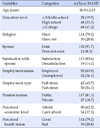Abstract
Purpose
In Korea, people in the baby-boom generation are now experiencing the aging phenomenon and they differ significantly from previous generations with social and historical experience as well as population size. The purpose of this study was to clarify the relationships between death anxiety, death preparation, gratitude and the degree of quality of life in baby-boom generation women.
Methods
For the study 144 participants who lived in Jeonbuk area were enrolled. A questionnaire survey method including several tools was used. Data were collected from February 23 to March 20, 2016 and analyzed using descriptive statistical analysis, ANOVA, Pearson correlation with SPSS/WIN 18.0.
Results
The major findings are summarized as follows: (1) Scores for death anxiety, death preparation, gratitude and the quality of life were average. (2) There was significant negative correlation between gratitude and death anxiety. Gratitude had significantly positive relations to death preparation and quality of life.
Figures and Tables
References
1. Statistics Korea. Estimated future population: 2010-2060 [Internet]. 2011. 12. cited 2016 Mar 5. Available from: http://kosis.kr/ups/ups_01List.jsp?grp_no=&pubcode=PJ.
2. Shin KA, Han MJ. The Korean babyboomers as new seniors: their attitudes and perceptions about life after retirement and their content needs for successful transition. Media Gend Cult. 2013; 25:113–144.
3. Chung KH. Characteristics and welfare needs of the Korean baby boom generation. Health Welf Policy Forum. 2011; 174:5–10.
4. Byun M. Babyboomers in Seoul, change the future of the city. Policy Reports. Seoul: Seoul Institute;2010. 09. Report No. 71.
5. Erikson EH. The life cycle completed, a review. New York: Norton;1982. p. 108.
6. Lee LJ. A study on the current state of death education and urgent problem. Korean J Educ Gerontol. 2016; 2(1):69–88.
7. Choo YJ. The meaning of death. Seoul: Ikseon Publishers;1980. p. 207.
8. Bae YK. The death of the world. Seoul: Gyomoom Publishers;1992. p. 512.
9. Lee YJ. A study on the relationship between elderly consciousness regarding preparation for death and anxiety of death [master's thesis]. Seoul: Catholic University;2005. 74.
10. Lee SJ. Babyboomer's retirement preparation and direction of plan support of retirement. Issue & Focus [Internet]. 2011. 08. cited 2016 Mar 5. 98. Available from: https://www.kihasa.re.kr/web/publication/periodical/issue_view.do?menuId=50&tid=38&bid=21&searchForm=Y&keyField=title&searchStat=2016&key=%EB%85%B8%ED%9B%84%EC%A4%80%EB%B9%84&aid=98&ano=1.

11. McCullough ME, Emmons RA, Tsang J. The grateful disposition: a conceptual and empirical topography. J Pers Soc Psychol. 2002; 82:112–127. DOI: 10.1037/0022-3514.82.1.112.

12. Kwon SJ, Kim KH, Lee HS. Validation of the Korean version of gratitude questionnaire. Korean J Health Psychol. 2006; 11(1):177–190.
13. Kim KM, Kim JH. A qualitative study on the gratitude experience based on the ground theory. Korean J Couns Psychother. 2011; 23(3):739–759.
14. Son S, Park JY, Suh KH. Relationships between gratitude disposition, subjective well-being, and feeling of happiness among female workers: focused on mediating effects of job attitude. Korean J Stress Res. 2015; 23(4):215–223.

15. Ro YJ. A study on the analysis of quality of life of middle-aged adults in Seoul [dissertation]. Seoul: Yonsei University;1988. 86.
16. Bowling A, Windsor J. Towards the good life: a population survey of dimensions of quality of life. J Happiness Stud. 2001; 2:55–81.
17. Thorson JA, Powell FC. A revised death anxiety scale. Death Stud. 1992; 16(6):507–521. DOI: 10.1080/07481189208252595.

18. Park EK. Development of an instrument for the measurement of death concern [master's thesis]. Seoul: Korea University;1995. 46.
19. Oh MN, Choi WS. A study on self-esteem, death anxiety and depression of the elderly in home and facilities. Fam Environ Res. 2005; 43(3):105–118.
20. Jo KH, Lee HJ. The impact of death anxiety and personal meanings of death on the attitude of dignified death among Korean mid-life and the elderly: mediating effect of family communication process. Korean J Adult Nurs. 2011; 23(5):482–493.
21. Chung S, Kim SH, Koo MJ. The relationship between death related factors and death preparation: a comparison of pre-elderly and baby-boomers. Korea J Popul Stud. 2014; 37(1):131–153.
22. Park DS, Park MK, Moon KR. Effects of group art therapy using reality therapy on the gratitude tendency, hopelessness depression, and life satisfaction level of the elderly with chronic illness. Korean J Art Ther. 2010; 17(6):1473–1495.

23. Kim JS. The impacts of gender and religion on gratitude disposition. J North-East Asian Cult. 2014; 38:197–208.
24. Jo HN, Chong YS. Exploring the positive function of grateful disposition in Korean elderly women. Korean J Dev Psychol. 2011; 24(4):163–188.
25. Lim SJ, Auh S. The research on the ecological influential factors of the perceived quality of life among the middle aged adults. J Korean Fam Resour Manage Assoc. 2011; 15(4):129–147.
26. Lee DH, Kim SC. The effects of the quality of life on the middle-aged women according to the participation of sports activity. Korean J Sport Psychol. 2003; 14(4):127–147.
27. Ministry of Health and Welfare. 2011 National survey on low fertility and aging [Internet]. 2011. 11. cited 2016 Mar 3. Available from:http://www.mohw.go.kr/front_new/jb/sjb030301vw.jsp?PAR_MENU_ID=03&MENU_ID=0328&CONT_SEQ=267427&page=1.
28. Cryder CH, Kilmer RP, Tedeschi RG, Calhoun LG. An exploratory study of post traumatic growth in children following a natural disaster. Am J Orthopsychiatry. 2006; 76(1):65–69. DOI: 10.1037/0002-9432.76.1.65.

29. Adler MG, Fagley NS. Appreciation: Individual differences in finding value and meaning as a unique predictor of subjective well-being. J Pers. 2005; 73(1):79–114. DOI: 10.1111/j.1467-6494.2004.00305.x.





 PDF
PDF ePub
ePub Citation
Citation Print
Print






 XML Download
XML Download